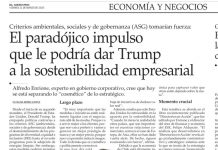Fuente: Harvard Business Review
Autor: Mark R. Kramer
In his recent annual letter to CEOs, BlackRock CEO Larry Fink makes the stunning claim that climate change has brought us to “the edge of a fundamental reshaping of finance” and “in the near future … a significant reallocation of capital.” BlackRock has committed to “place sustainability at the center of [its] investment approach.” Although BlackRock cannot divest of companies in its index funds, Fink makes it clear that they will be “increasingly disposed to vote against management and board directors when companies are not making sufficient progress on sustainability-related disclosures and the business practices and plans underlying them.”
This is a warning from the world’s largest shareholder that public companies dare not ignore. It also brings together three corporate roles that have rarely been in the same room: finance, investor relations, and sustainability.
For most companies, sustainability has been an afterthought. Rather than fundamentally shifting their business model in the recognition that sustainability and the welfare of all stakeholders are essential to the company’s long-term success, they have instead relegated social issues to the corporate social responsibility (CSR) department or charitable foundation and published the results of their efforts in a glossy annual sustainability report. The problem is, investors don’t read sustainability reports.
Nor should they. As my colleagues Michael Porter, George Serafeim, and I point out in a recent article, “Where ESG Fails,” most sustainability reporting is unreliable, inconsistent, and largely covers factors that are immaterial both to the economic performance of the company and to the company’s global impact. In a separate report, Serafeim adds: “All companies have impacts, defined as changes in important positive or negative outcomes for people or the planet, almost all of which is not currently measured in a comparable or comprehensive way.”
If Fink is correct in predicting that capital will increasingly be allocated to those companies with the most sustainable business models, then investors will need new sources of data to understand and anticipate the economic significance of sustainability strategies.
This means that companies will need to communicate very differently with their investors. Disclosing their performance on the most material social issues (determined by the Sustainability Accounting Standards Board) as Fink recommends, is a necessary step.
But the more fundamental question is whether a given business is positioned to thrive in a future world transformed by climate change and financed by investors who care about social impact. And if that message is to be heard by the capital markets, it will have to come through financial statements, quarterly earnings calls, and investor briefings — not sustainability reports.
Already, there is evidence that markets respond when companies share their plans to address the social and environmental issues that affect their businesses. When CEOs presented their long-term plans to major asset owners at events organized by the Strategic Investor Initiative of the Chief Executives for Corporate Purpose (CECP), the plans almost always include ways the companies will shift their business models to address climate change, economic opportunity, and stakeholder well-being. One study found that the company’s share prices reacted to these presentations, even though near-term earnings forecasts were unchanged. In other words, if you give investors the data, they will use it.
But long-term thinking alone is not enough. What is needed is a new language — or at least a new way of bridging social impact and economic performance. Companies must begin to report on the shared value they create, a new kind of double-entry accounting system. Alternatively, Serafeim has proposed the development of “impact-weighted accounts,” a line item on financial statements that reflects the company’s impact on all stakeholders, the environment, and the broader society.
There will be many challenges in developing shared-value accounting or impact-weighted accounts. (The social impact consultancy I co-founded, FSG, is launching a study in this area and is seeking companies to participate.)
But even today, companies that differentiate themselves through positive social impact are thriving. When Walmart raised entry-level employee wages, turnover declined, and productivity increased. When Novartis brought health education to rural villages in India, it opened a new market of 70 million potential customers. When PayPal found a way to extend financing to small businesses that were denied credit, it opened a $10 billion market opportunity. What even these exemplary companies fail to do is effectively convey to investors the causal link between their social impact and economic performance. And without that link, investors cannot reliably distinguish the companies that will thrive from those that will wither.
The future that Larry Fink envisions is not far away, and BlackRock’s financial heft will accelerate its arrival. The need for a new language that bridges sustainability and finance is now.












